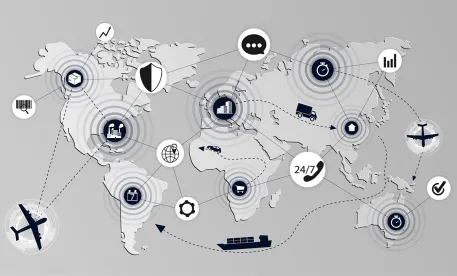As countries, economies, and businesses adjust to life in the COVID-19 era, many governments have started to ask questions about the wisdom and longer term implications of allowing key components of socially or economically critical products like pharmaceuticals, medical devices, and defense products to be sourced beyond domestic borders. One key area of concern – and an area of weakness that the pandemic has revealed – is that many supply chains in crucial industries rely on a limited number of suppliers and/or on suppliers in a limited geographic region.
In France, Finance Minister Bruno Le Maire has called for a review of French industries to assess their reliance on companies in China and Asia in their supply chains, and to identify which industries need to develop “economic and strategic independence.” Le Maire specifically noted that France’s pharmaceutical and automotive industries rely on sources in China or Asia for essential components, such as raw materials for active ingredients in drugs and brake pedals. Similarly, since November 2019, the Japanese government has begun to lower the allowable foreign investment ownership level threshold for companies in fields critical to national security, and has recently added vaccine, medicine, and advanced medical equipment makers to the list. And in the US, various federal agencies have begun inquiries to understand better how key components of certain critical products are sourced.
These developments suggest that businesses should consider the resilience of their supply chains and take steps to diversify their suppliers geographically. And, for essential products, businesses and governments should consider the extent to which it makes sense to develop a reshored domestic supplier base.
But how easy is it to reshore, and how should companies go about doing this?
To find guidance, we talked with Rosemary Coates, the Executive Director of the California-based Reshoring Institute, a non-profit that provides information, research, and support for companies trying to reshore their manufacturing and services back into the United States. (Full disclosure, Rosemary is also co-author of the supply chain treatise, Legal Blacksmith: How to Avoid and Defend Supply Chain Disputes, with SPB partner Sarah Rathke. She is also an expert witness and the President of Blue Silk Consulting.)
Leaving China
Rosemary agrees that pharmaceutical sourcing will likely start moving back to domestic suppliers, where possible. However, she cautions that moving operations away from China – for example – is not as easy as companies might like. In China, Rosemary points out, most employees have employment contracts, with the typical duration being 1-2 years. Thus, companies seeking to leave China cannot simply terminate workers; rather, these employment contracts in most instances must be fully paid.
Another complication is that, typically, manufacturers in China are not permitted to simply move their tooling and equipment out of China. According to Rosemary, “Chinese manufacturers consider machinery, tools and molds that a customer may have provided for production as part of their infrastructure, no matter who you think owns it. It will not matter to the Chinese government whether a non-Chinese company purports to have contractual ownership rights to the equipment. The Chinese government may not allow the equipment to be exported when you close the factory.”
A third major issue with moving away from China, according to Rosemary, is that by operating in China, “You have taught your Chinese suppliers how to make your products, and they are not likely to stop just because you are no longer doing business there.” As most international companies are aware, China takes a constrictive view of the intellectual property rights of foreign manufacturers, so once a company moves its supplier production out of China, it will need to be prepared to compete against this product (which is why Rosemary encourages US manufacturers not to manufacture their latest product editions in China).
Resourcing Sensibly
Issues of leaving China aside – which are likely intractable – successfully reshoring requires robust strategic planning. In order for a company using US manufacturing to compete, its domestic labor rates must either be comparable to non-US labor rates, or enough labor must be extracted from production to be cost-competitive, according to Rosemary. This, obviously, means automation. Thus, companies must re-engineer their operations to determine how to produce more efficiently. The result is likely to include advanced automation, the use of robotics, 3D printing, and IoT.
Approaching reshoring in this way naturally means that fewer manufacturing jobs will be created for Americans than if a company were to simply staff its US production the same way that it did in China. However, jobs in automated factories require a skilled and trained work force, and for companies willing to engage in that endeavor, a way to begin to return robustness to the US working class. These new jobs will be more technical and better paying than their non-US hourly counterparts, and helping to rebuild the economic middle-class is at the heart of the Reshoring Institute’s mission.
Of course, companies that want to leave China or diversify in other low-cost markets (not the US) face different challenges, according to Rosemary, essentially figuring out how to vet alternative suppliers in unknown and untested jurisdictions. China’s rise as a manufacturing giant means that they are good at it, and their workers are very efficient and productive. For manufacturing in other countries, it will likely take time to build up the same level of expertise, so companies should be prepared to be as involved as possible, and to be patient.
However, for companies making the move now, there is obviously very little ability to travel and to vet directly alternative foreign suppliers. Rosemary counsels, nevertheless, that companies must conduct due diligence of potential alternative suppliers in a thorough way. Now that trade shows have been eliminated due to COVID-19 (which was a traditional method of being introduced to suppliers), Rosemary recommends retaining experienced counsel in the jurisdiction that a company is considering to make introductions, but more importantly to investigate and validate business licenses, experience, and longevity of potential suppliers. Companies should avoid sourcing agents and trade representatives unless they are well-known.
We will continue to follow these trends on this blog, so stay tuned!





 />i
/>i

